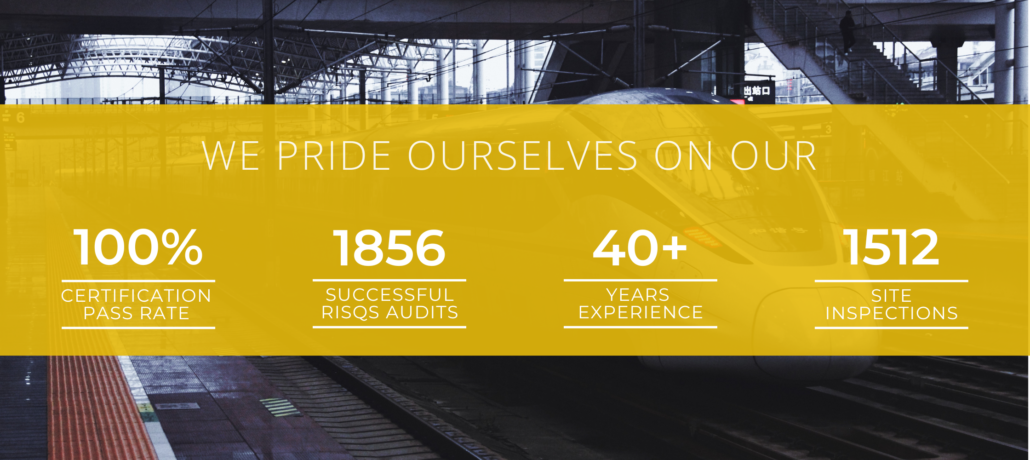Common Pitfalls in the RISQS Audit Process and How to Avoid Them
Introduction:
Navigating the RISQS audit process is crucial for businesses operating in the UK Rail Industry. However, many organisations encounter common pitfalls that can hinder their success. This article identifies these common issues and provides practical solutions you can implement to avoid them, ensuring a smoother audit experience and compliance with RISQS standards.
Common Pitfalls in the RISQS Audit Process:
-
Inadequate Preparation:
- Pitfall: Many businesses fail to adequately prepare for the audit, leading to incomplete, disorganised or unreviewed documentation and evidence. This often results from underestimating the complexity of the RISQS audit.
- Solution: Conduct a thorough internal audit and review your systems to ensure all elements are up to standard. Organise all evidence into clear sections related to each audit question, covering health, safety, quality, environmental, and technical aspects. An internal audit helps identify gaps and areas that need improvement well in advance, reducing last-minute scrambling. Consider using a detailed checklist to ensure all required documents and processes are in place.
-
Poor Documentation and Record-Keeping:
- Pitfall: Insufficient documentation to support compliance with RISQS standards is a frequent issue. This includes incomplete records of health and safety protocols, quality management procedures, competency verification, and environmental practices.
- Solution: Implement a robust management system that centralises all compliance-related documentation. Ensure all records are up-to-date and easily accessible to facilitate smoother audits and continuous compliance monitoring. Use digital tools to maintain records and automate updates, which can significantly enhance efficiency and accuracy. Regularly review and update the documentation to ensure it reflects current practices and standards.
-
Lack of Competency Verification:
- Pitfall: Failing to verify and document the competency of employees and contractors can lead to non-compliance. This includes not keeping up with regular training and certification.
- Solution: Establish a comprehensive training program that ensures all staff meet RISQS standards. Regularly update training and certification records to reflect current competencies. Implementing a competency matrix can help track qualifications, training schedules, and certification renewals, ensuring no lapse in compliance. Encourage ongoing professional development and provide resources for employees to stay current with industry standards.
-
Neglecting Health and Safety Protocols:
- Pitfall: Inadequate adherence to health and safety protocols can result in serious audit failures. This often includes missing or outdated safety documentation and rail standard updates.
- Solution: Ensure that all health and safety measures are rigorously followed and documented. Regular risk assessments and incident reporting should be a routine part of your operations. Engaging health and safety professionals to conduct periodic reviews and updates can ensure ongoing compliance and enhance workplace safety. Foster a culture of safety within the organisation by regularly communicating the importance of health and safety protocols to all employees.
-
Failure to Conduct Pre-Audits:
- Pitfall: Skipping pre-audits and reviews can leave unidentified gaps and deficiencies in your compliance status, leading to potential audit failures.
- Solution: Conduct pre-audits to identify and address any issues well before the official RISQS audit. This helps ensure that all system elements are reviewed and compliant. Pre-audits can simulate the actual audit environment, providing valuable insights and preparing your team for the official audit day. Use the findings from pre-audits to make necessary adjustments and improvements to your compliance processes.
-
Inadequate Environmental Management:
- Pitfall: Not adhering to environmental management standards or failing to implement eco-friendly practices can result in non-compliance.
- Solution: Develop and integrate environmental management practices into your operations. Regularly review and update these practices to ensure they meet RISQS and broader environmental standards. Implementing an Environmental Management System (EMS) like ISO 14001 can help streamline compliance and improve environmental performance. Encourage sustainable practices such as reducing waste, conserving energy, and minimising any environmental impact.
-
Overlooking Rail Group and NR Standards:
- Pitfall: Failing to consider and comply with Rail Group and Network Rail (NR) standards can lead to audit issues.
- Solution: Review and ensure all relevant Rail Group and NR standards are captured and complied with, including issue numbers, dates, and records. Engage with industry consultants who can provide updates on changes in standards and ensure your practices are aligned with the latest requirements. Regularly participate in industry forums and workshops to stay informed about best practices and emerging trends.
-
Poor Communication and Project Management:
- Pitfall: Lack of clear communication and project management can cause delays and misunderstandings during the audit process.
- Solution: Assign a dedicated project manager to oversee the entire RISQS audit process. This ensures complete oversight and clear communication throughout the audit preparation and execution phases. Effective project management involves regular check-ins, clear documentation, and a well-defined timeline to keep the process on track. Utilise project management software to track progress and manage tasks efficiently.
Benefits of Meeting RISQS Compliance Standards:
Meeting RISQS compliance standards greatly enhances your business’s marketability by opening up new opportunities and partnerships, as clients prefer engaging with certified suppliers. It also mitigates risks by reducing the chances of legal issues, accidents, and operational disruptions through adherence to stringent safety and quality protocols. Additionally, compliance fosters operational efficiency by streamlining processes and ensuring consistency, leading to cost savings and increased productivity. Lastly, it builds a strong reputation and trust, positioning your business as a reliable and compliant supplier in the rail industry.
Conclusion:
In summary, understanding and adhering to RISQS compliance standards is crucial for businesses in the UK Rail Industry. These standards ensure safety, competence, and quality, fostering trust and opening up business opportunities. Achieving RISQS compliance involves a commitment to rigorous health and safety protocols, quality management, competency verification, and environmental sustainability.
For businesses seeking guidance and support in navigating the RISQS compliance process, Simpson Consultancy offers expert services to help you achieve and maintain compliance, ensuring long-term success in the rail industry. Contact us today for professional assistance and a competitive, no-obligation quote.







